
|

|
|
|
|
| | VOLUME 29, NUMBER 10 | WEDNESDAY, NOVEMBER 11, 1998 | ISSN 1199-5246 | | |
|
|
||
|
|
TRUDEAU CONFERENCE: Journalist Andrew Cohen and York professor emeritus Jack Granatstein, both editors of new books on Pierre Trudeau, were among those at the York conference.
More than 300 people paid good money recently to hear cultural and political pundits analyze the charisma, influence and ongoing appeal of a political figure whose reign ended almost 30 years ago. The person is, of course, Pierre Elliott Trudeau. The question is why? What is it that has made Pierre Trudeau and his era such an enduring legacy and a puzzle? Was it Trudeau's "charisma" or his policies that have engaged us and continued to perplex us even now, years after that era has passed? There is no simple answer, which is why any man as complex as Trudeau needs more than just an hour of discussion. He needs a conference. At least, that was English professor Bruce Powe's feeling when he first approached four York colleges for support for a Trudeau conference more than a year ago. The result of Powe's vision came to fruition with "The Trudeau Era Culture, Media, Politics." The three-day event ran from Oct. 22 to 24, and included a launch of two new books about the man who shocked, irritated, but always engaged, Canadians. Powe, Winters College's academic advisor, has always been intrigued by the meaning of Trudeau for Canada and Canadians, and he has long counted him as a personal friend. Indeed, our former Prime Minister shows up in one of Powe's early books on cultural criticism as one of his "solitary outlaws" (along with cultural icons such as Glenn Gould and Marshall McLuhan.) How can a man who formally retired from public life long ago still generate such controversy and discussion? For Powe, that is one aspect of Trudeau's myth and mystery. Powe says he felt the time was right to re-examine what Trudeau meant to us, and what he goes on meaning. His influence has shaped much of the critical issues still facing Canada today. As language issues, a pending Quebec election, human rights and international policies continue to preoccupy Canada afresh, the discussion on his legacy and influence takes on new relevance, claims Powe. "We wanted to review and re-evaluate Pierre Trudeau," he says. "Having the conference was a way to look at his aspirations and accomplishments, and examine the political and cultural heritage of the Just Society. It's my ambition to re-ignite the debate about what liberalism means for Canada." Winters College Master Andrew Tomcik opened the conference, noting in his remarks that organizers (Winters, Calumet, McLaughlin and Vanier Colleges were all co-sponsors) worked hard to pull the event together. "This conference was a true interdisciplinary venture, which is why the colleges banded together," he said in a later interview. "It's a big undertaking to mount a conference like this. Staff and students worked extra hard during the last month. They deserve a lot of credit." Vice-President (Academic Affairs) Michael Stevenson welcomed a large audience to the inaugural evening in Moot Court at Osgoode Hall Law School. Stevenson noted that York itself had considerable interest in the Trudeau era since that was the time when much of the "character of this institution was formed in its adolescence. I think we imbibed much of the thrill and excitement of Trudeau's persona during the high days of his political life. "For instance, there is the ongoing importance and deepening of the issue of bilingualism," noted Stevenson. "York took that as a commitment. You see its result in Glendon College. I think the development of York in some ways mirrors Trudeau's concerns: his concern with multiculturalism and internationalism." Stephen Clarkson, co-author of a comprehensive two-volume work on Trudeau and his era, delivered the keynote address, opening a conference that included many Trudeau experts such as the former PM's biographers, dozens of scholars, journalists, and political insiders who held high positions during the Trudeau years. Clarkson said trying to understand Trudeau and his influence was a "minefield." But as for the question "why now?" Clarkson suggested there seemed to be a current interest in the man, surmising that perhaps that interest said something about our anxiety over the future. "Our reality is changing, our fix on the past is changing. The question is: what do we judge him on?" Clarkson charged that Trudeau's politics were "largely a failure," and wondered, then, why people were so interested in talking about him. "We're fascinated because of his charisma," said Clarkson, noting that Trudeau has now been retired for almost as long as he was in power. "Even today, he is still charismatic among opinion makers. In his glory days, he was a figure who had his followers. To be a leader you have to be powerful, sexy, rich, etc., so that followers can respond. It's a circle of cause and effect. In 1968 Trudeau was the Messiah...he was the guy who would put Quebec in its place. "But what about Trudeau the person? What is there special about him? He was very unusual as an intellectual in politics. Not many have been successful. He went in and clarified his views. He wrote his script. Then in politics he rehearsed the script. He was always careful about image, always rehearsing his actions even when they might have appeared to be spontaneous. He was a consummate actor, as all successful politicians are." Addressing the question of "why now?", why there is a resurgence of interest in Trudeau, Clarkson suggested that post-politically he didn't suffer political death, and that his word and his influence are still with us. "But there is also a deeper explanation, I think," said Clarkson, "and that has to do with the failure of the neo-liberal paradigm. The lean and mean State isn't delivering in times of crisis. This new paradigm isn't delivering. The question is, what is it in Trudeau's liberalism that might make sense for the future?" In his own short address on the conference's second day, Powe also tackled the question of 'why now'. "Of course there is the style, the elegance to be considered, but I think there was also an idea of Canada that continues to engage us," said Powe. "Trudeau was interested in three questions: What is justice? What is the good? and what is Canada or what is a Canadian?" Yet, paradoxically, Trudeau biographer Richard Gwyn noted that the quixotic nature of Trudeau lay in his very un-Canadianness. "Canadians liked that he was not what we typically thought of as 'Canadian'," said Gwyn. "We also liked the fact that Trudeau didn't seem to get on well with Americans. It helped us identify ourselves." While Trudeau himself declined an invitation to attend, he asked that the conference not be an exercise in hagiography or in political bashing. "He wanted discussion and debate," noted Powe. "And I told him that as far as I could promise it I would see that was what happened." Other participants included: the editors of two new books on Trudeau journalist Andrew Cohen and York professor emeritus Jack Granatstein (Trudeau's Shadow, Random House Canada) and writer Ron Graham (The Essential Trudeau, McClelland and Stewart); early Trudeau biographer and journalist Richard Gwyn; former Trudeau principal secretaries Jim Coutts and Tom Axworthy; Trudeau-era Cabinet Minister Iona Campagnolo; historians Michael Bliss, Guy Laforest and Ken McRoberts; philosopher Mark Kingwell, Cité Libre editor Max Nemni; writer Linda McQuaig; McLuhanite Derrick de Kerckhove; and actor and playwright Linda Griffiths, among others.
Senator Keith Davey, journalist Anthony Westell and York professor emeritus Jim Gillies were among the officials gathered for the Trudeau conference at York. |
|
|
|
AUTOMATISM IN PERFORMING ARTS: Quebec dancer Ginette Boutin, pictured here, is one of the performers coming to York this weekend for celebrations of the 50th anniversary of the Automatist movement. Boutin is dancing the "Black and Tan Fantasy" by renowned choreographer and visual artist Françoise Sullivan, one of the lead presenters at the symposium, exhibition and performance event. Photo by Cylla von Tiedemann.
The Automatists attacked conformity and academia in the name of generous spontaneity. Automatism is recognized today as perhaps the most important modernist movement in Canada, and certainly the most cohesive and interdisciplinary. Automatism produced some of Canada's first and most radical non-figurative art and photography, experimental poetry, music and theatre, modern dance, and pioneering work in radio and television. The group known as the Automatists was influenced by French Surrealism. Although the best-known members of the movement are painters Paul-Emile Borduas and Jean-Paul Riopelle, Automatism has had a far-reaching impact on many art forms and artists. "This is the 50th anniversary of the publication of the Automatist manifesto, Refus global," said Atkinson professor Ray Ellenwood, the lead organizer of the symposium. "This event is being celebrated in Montreal, Ottawa, and Paris so why not in Toronto as well?" To that end, York University is hosting a symposium, exhibition and performance this weekend, (Friday, Nov. 13 and Saturday, Nov. 14.) The event is called "Make Way for Magic! Montreal Automatism: 1948 and Onwards." In the past, examinations of Automatism have often focused on visual arts, but this event will be the first conference anywhere to emphasize the performing arts and their place in the history of Automatism, said Ellenwood. He is director of the Graduate Program in English at Atkinson College. He is teaching a course this term on Automatism in the Graduate Program in Art History. "The manifesto has had a great impact in Quebec, but not exclusively in Quebec," said Ellenwood. "It has been recognized by scholars across the country as an important social and historical statement one of the first and most important statements of modernism in Canada." "The manifesto and the works of the various artists have also influenced visual artists, poets, dancers and musicians across the country some of whom will be at the conference," said Ellenwood. Among the participants will be two of the people who originally signed the Refus global manifesto Françoise Sullivan, a dancer, choreographer and visual artist (who received an honorary degree from York University at last week's convocation ceremonies), and Pierre Gauvreau, a television writer. Other presenters include: dancer/choreographer Jeanne Renaud; composers Christopher Butterfield and R. Murray Schafer; cultural historians Patricia Smart, Ramsay Cook, Gilles Lapointe, and Ginette Michaud, mezzosoprano Fides Krucker; and other performers, including student musicians, dancers and actors from York University and the University of Toronto. An Evening of Automatist Dance, Theatre and Music will take place on Saturday, Nov. 14 at 8 p.m. in the Burton Auditorium, Centre for Fine Arts. This free event will include the York Dance Ensemble's new production of Dualité, a dance choreographed by Françoise Sullivan and first performed by her and Jeanne Renaud in 1947. Two other early dances by Sullivan will be performed by Quebec dancer Ginette Boutin. There will also be the first stagings outside Quebec of some of Claude Gauvreau's theatrical pieces, with short works presented by the York Theatre Group and excerpts of Les oranges sont vertes, performed by actors from Montreal's Théâtre du Nouveau Monde. Contemporary musical settings by Christopher Butterfield of Gauvreau's sound poems, Jappements à la lune, will be performed by vocalist Fides Krucker and the Contemporary Music Ensemble of the University of Toronto, conducted by Gary Kulesha. Events in the Burton auditorium begin on Friday, Nov. 13 at 1:30 p.m. and on Saturday, Nov. 14 at 2:30 p.m. Registration cost is $35. Students with identification may register for free. In conjunction with the symposium, there will be an exhibition on Automatism, featuring photo and text images, posters and programs, a selection of books, and slides and videos documenting the movement and the work of Automatist artists in various media. The exhibition is being held in the IDA Gallery, Main Lobby, Centre for Fine Arts, from Monday, Nov. 9 through Saturday, Nov. 14. Exhibition hours will be Monday to Thursday, 9 a.m. to 4 p.m., Friday, Nov. 13 from noon to 8 p.m., and Saturday, Nov. 14 from 2 to 10 p.m. These events have been organized with the support of the Departments of Dance, Film & Video, Theatre, Visual Arts, and the Wendy Michener Symposium, Faculty of Fine Arts; the Graduate Programs in Art History and English; Atkinson College; and the Ad Hoc Research Fund, York University; le Conseil des Arts et des Lettres du Quebec; the Social Sciences and Humanities Research Council of Canada; Best Western Hotels, and the Quebec Government Office in Toronto. For more information or to register for the conference, call (416) 736-5533.
This poster was created for the celebration of the 50th anniversary of Automatism. |
|
|
|
TENNIS, ANYONE? Third-year student Sarah Bell continues to succeed both academically and on the courts.
When people think about tennis at York, they usually think of the Canadian Open Tennis tournament sponsored by Tennis Canada every year, but this year, York played host to the OUA (Ontario University Athletics) championships. The National Tennis Centre drew in the best tennis players that Ontario universities have to offer. Among them was York's own Sarah Bell, who excels on and off the court. Bell, who is going into her third year majoring in kinesiology, received a continuing scholarship this year based on her academic portfolio, including a GPA of 8.13. Bell has been on the Faculty of Arts Dean's honour roll and the kinesiology program honour roll for the past two years. "My academic success is very important to me," says Bell. "I can't imagine spending all the money that I am on my education and not worrying about it. I don't obsess over it though. I only do the best that I can, and am usually satisfied knowing that I did everything I could, no matter what my grades are." The combination of school and tennis can sometimes be trying for Bell. With two-hour practices four days a week as well as weekend matches, she is forced to stay alert and focused even when she'd rather not be. "The beginning of the school year is always tough," says Bell. "It takes time to adjust to getting back into the routine of school, and I seem to get busy faster than I'm ready. It's hard to know how I manage my school work and tennis. I just prioritize, I guess." Prioritizing for Bell means coming home from practice and hitting the books right away. Even though she'd like to relax for a while, she waits until after she has completed all her assignments before relaxing. "I also try to maintain a healthy focus about it, because getting too overtired and stressed about school work just ends up doing me harm in the end," says Bell. "I just do what I can, and usually that is enough." Her tennis achievements match her academic ones. During her five years of high school Bell represented York region and managed to capture the gold or silver every year.The highlight of her tennis career came during her first year at York. "In my first year, our tennis team won the silver medal at the Ontario championships, so that was a great way to start my university tennis career," says Bell. "I never really played many competitive tournaments before university. I always played tennis for my own personal enjoyment." Tennis brings enjoyment to her life and her academic success brings satisfaction. On the whole, Bell is living the fulfilled life. Marylyn White is a third-yearstudent and a media relations officer at Sport York. |
|
|
|
Vanier College Productions presents Michel Tremblay's Hosanna Vanier College Productions is staging a production of Hosanna by Quebec playwright Michel Tremblay. Hosanna is the story of a drag queen's search for his own identity. In response to a cruel and insensitive joke, Hosanna (Claude) examines his relationship to the gay community, his own personal life, his self-esteem and his dignity. This deeply intriguing and haunting exploration of personal reality speaks to everyone who dares to be different and yet remain true to oneself. It is directed by Fred Thury and stage managed by Eva Mai Fortune. Ryk Simpson plays Cuirette and Ryan Bureyko plays Hosanna/Claude. The play runs from Nov. 4 to 7 and Nov. 11 to 14 in Vanier College Studio Theatre, Room 258 Vanier College, East entrance, 2nd floor. Tickets cost $8 for students and seniors, $10 for general admission. For more information, call Kevin Greenspan at (905) 707-7190 or (416) 736-2100, ext. 40023 or email: green spn@yorku.ca. * * * Watch night skies for Leonid meteor showers In the early morning hours of Nov. 17 and 18, bundle up with a sleeping bag and a thermos of coffee and lay out in your backyard to watch the annual Leonid meteor showers. Described as a spectacular display like a meteor storm, this is one of the finest celestial events that people can witness with the naked eye. All you need is a dark night with a clear sky, and the best viewing position is laying on your back looking towards the eastern sky. According to astronomy professor Paul Delaney, the meteor shower will reach its maximum visibility between 1 a.m. and dawn on Tuesday, Nov. 17. But this natural "fireworks display" will be impressive for two or three days either side of Nov. 17, so don't be discouraged if the weather is poor one evening. The Leonid meteor shower of 1833 revealed an estimated 150,000 shooting stars per hours and dazzled and terrified the world with the skies appearing to "rain light." Astronomers are predicting that the Leonids this year and over the next two years may be truly spectacular. A meteor is a small fragment of rock, typically a few centimetres in diameter, captured by the Earth's gravitational field and then heated to incandescence by friction with our atmosphere. The resulting release in energy is seen as a shooting star. The bigger meteors can be seen as fireballs, and typical speed of earth entry for a Leonid meteor is 71 km per second, making them some of the fastest and brightest meteors around. * * * Concert of Baroque and Celtic music The Kitty Lundy Memorial Fund presents Puirt a Baroque, Canada's premier crossover ensemble, in a concert of Baroque and Celtic music, on Thursday, Nov. 19 from 6:30 to 8 p.m. in DACARY Hall, basement level, McLaughlin College. You'll hear everything from elegant airs to rollicking reels, music from the ballroom and music from the pub. The event features: David Greenberg (violin/fiddle); Stephanie Conn (vocals/step dancing); Terry McKenna (guitar); David Sandall (harpsichord); and Kate Dunlay (fiddle/step dancing.) Members of the York community are invited to this free event, offered with the assistance of the Dean's Office and Office of the Master, Atkinson College. For information, email: cromalis@yorku.ca or phone: (416) 736-2100 ext. 66316. * * * Remembrance Day service and retirees' event today Don't forget about the Remembrance Day service happening today (Wednesday, Nov. 11) starting at 10:45 a.m. next to the flagpole on the Harry W. Arthurs Common in front of Vari Hall. As well, the day features the York Retirees' Showcase and Sale. Events include a craft sale running from 9 a.m. to 4 p.m. in the East Bear Pit and information booths in Vari Hall. All demonstrations will take place in the West Bear Pit. At 10 a.m., there will be demonstrations of tai chi, yoga, and decorative painting. At 11:20 a.m., a theatre demonstration by the Act II Studio Theatre Players will take place, and at 2:15 p.m., you can watch fitness and dance demonstrations. A retirees lunch with York President Lorna Marsden will be held at noon in the Faculty Club. All events are free, except for the luncheon, which is $12 per person. For more information, call (416) 736-2100, ext. 66228 or email: retiree@yorku.ca. * * * York longterm employees reception Members of the York University community who have worked here for 25 years will be honoured at a special reception on Monday, Nov. 16. The event will be held in the Faculty Club from 3 to 5 p.m. Congratulations and thanks to all those on campus for their many years of service to the University. |
|
|
|
York University's United Way campaign has raised more than $65,000 so far this year. The number of donors is 330. According to Campaign Coordinator Gillian Sewell, our campaign is off to a good start but it still needs your support to increase participation and to reach our goal of $115,000. "Some members of our staff and faculty have been very generous already in making donations, but so far our participation rate is less than 10 per cent of the more than 3,000 people who have been canvassed," said Sewell. "It is not too late to donate. A reminder pledge card should be arriving in the next couple of weeks." You can make a donation anytime by contacting Gillian Sewell at 280 York Lanes, calling (416) 736-2100 ext. 22083 or sending an email note to: gsewell@yorku.ca to make a donation at anytime. |
|
| | Current Issue | Previous Month | Past Issues | Rate Card | Contact Information | Search | |
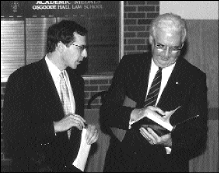 by Michael Todd
by Michael Todd
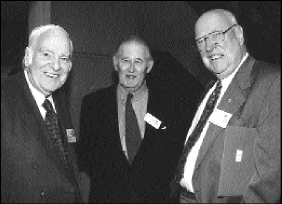
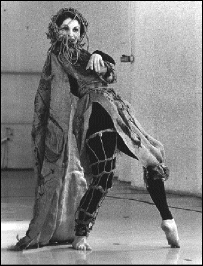 Fifty years ago, a group of young artists, writers and dancers in Montreal published a manifesto. The group called itself the Automatists, and the manifesto was titled Refus global. It was a resounding statement of modernism in Quebec that resonated throughout Canada.
Fifty years ago, a group of young artists, writers and dancers in Montreal published a manifesto. The group called itself the Automatists, and the manifesto was titled Refus global. It was a resounding statement of modernism in Quebec that resonated throughout Canada.
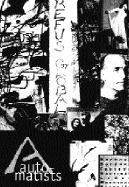
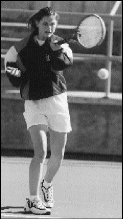 by Marylyn White
by Marylyn White